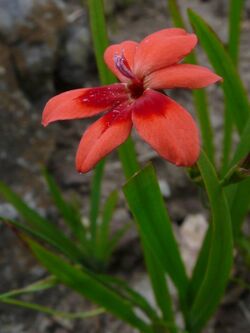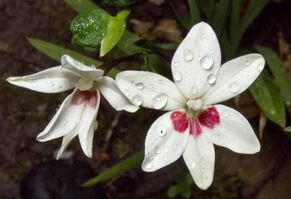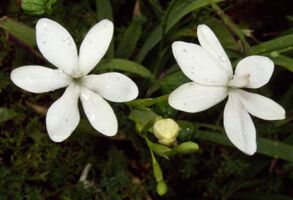Biology:Freesia laxa
| Freesia laxa | |
|---|---|

| |
| Scientific classification | |
| Kingdom: | Plantae |
| Clade: | Tracheophytes |
| Clade: | Angiosperms |
| Clade: | Monocots |
| Order: | Asparagales |
| Family: | Iridaceae |
| Genus: | Freesia |
| Species: | F. laxa
|
| Binomial name | |
| Freesia laxa (Thunb.) Goldblatt & J.C.Manning
| |
| Synonyms[1] | |
| |
Freesia laxa, commonly known as flowering grass,[2] is a small species of cormous flowering plant in the family Iridaceae, from eastern and southern Africa, from Kenya to northeastern South Africa.[1] It is grown in gardens as an ornamental plant.
Description
Freesia laxa grows from corms, reaching about 15–30 cm (6–12 in) tall. The green leaves are arranged in a flat "fan" from which the flower stalk emerges. The flowers are flattened, about 2 cm (0.8 in) across. Their colour varies considerably. The ground colour is red, white or pale blue. The bases of the lowest three tepals usually have a darker marking, which may be red or purple, although it is absent in the pure white form. The seeds are bright red.[3][4]
It is native to the eastern side of southern Africa,[3] from Kenya to South Africa ,[1] where it grows in somewhat moist conditions. It dies down to a corm in the winter, growing again at the end of spring and flowering in summer.[3] In the wild, in the Southern Hemisphere, it flowers between October and December.[4]
Systematics
This small bulbous species has been known by a variety of names. The name Gladiolus laxus was originally published by Carl Thunberg in 1823. Peter Goldblatt transferred the species to Anomatheca laxa in 1971; Nicholas Brown changed it to Lapeirousia laxa in 1928; Goldblatt with his colleague John Charles Manning settled on Freesia laxa in 1995.[1] Separately, in 1830, John Lindley described Anomatheca cruenta which John Baker transferred to Lapeirousia cruenta in 1892.[5] Lindley's plant is now regarded as part of Freesia laxa.[1]
Forms with blue flowers are treated as Freesia laxa subsp. azurea, other forms being placed in Freesia laxa subsp. laxa.[6]
Cultivation
Freesia laxa is sufficiently hardy to be grown outdoors in all but the coldest parts of the British Isles.[3] It requires a light soil and a sunny position. In colder areas, the corms can be lifted and dried off during the winter. It can be propagated by dividing groups of corms or by seed.[3] It can be somewhat invasive through self-sowing when grown in favourable conditions.[6]
This plant[2] and the white-flowered cultivar F. laxa var. alba[7] have gained the Royal Horticultural Society's Award of Garden Merit.[8]
References
- ↑ 1.0 1.1 1.2 1.3 1.4 "Freesia laxa", World Checklist of Selected Plant Families, Royal Botanic Gardens, Kew, http://apps.kew.org/wcsp/namedetail.do?name_id=328131, retrieved 2012-08-13
- ↑ 2.0 2.1 "RHS Plantfinder - Freesia laxa". https://www.rhs.org.uk/Plants/167668/i-Freesia-laxa-i/Details. Retrieved 27 February 2018.
- ↑ 3.0 3.1 3.2 3.3 3.4 Mathew, Brian (1987), The Smaller Bulbs, London: B.T. Batsford, ISBN 978-0-7134-4922-8, p. 9
- ↑ 4.0 4.1 Innes, Clive (1985), The World of Iridaceae, Ashington, UK: Holly Gate International, ISBN 978-0-948236-01-3, p. 18
- ↑ "Anomatheca cruenta", World Checklist of Selected Plant Families, Royal Botanic Gardens, Kew, http://apps.kew.org/wcsp/namedetail.do?name_id=326436, retrieved 2012-08-13
- ↑ 6.0 6.1 6.2 Freesia, Pacific Bulb Society, archived from the original on 2012-06-22, https://web.archive.org/web/20120622234346/http://www.pacificbulbsociety.org/pbswiki/index.php/Freesia, retrieved 2012-08-13
- ↑ "RHS Plant Selector - Freesia laxa var. alba". https://www.rhs.org.uk/Plants/303181/Freesia-laxa-var-alba/Details. Retrieved 7 June 2020.
- ↑ "AGM Plants - Ornamental". Royal Horticultural Society. July 2017. p. 39. https://www.rhs.org.uk/plants/pdfs/agm-lists/agm-ornamentals.pdf. Retrieved 27 February 2018.
- Pink, A. (2004). Gardening for the Million. Project Gutenberg Literary Archive Foundation. https://www.gutenberg.org/ebooks/11892.
External links
| Wikimedia Commons has media related to Freesia laxa. |
Wikidata ☰ Q5501152 entry
 |



